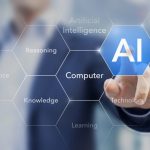How Artificial Intelligence unlocks 'extreme' screening tactics

Since the birth of social media, employee vetting, including social media background checking, has been a way for employers to legally or illegally gain information about employees or prospective hires. They know what we all know: posts on Facebook and Twitter can shed a light on our true selves in a way that a resume or job interview might not.
Until now, employee screening tactics and social media checks have only been as powerful as the amount of time employers sink into them. That could change dramatically as artificial intelligence gets in on the action.
Google brings AI-powered GIF, emoji and sticker suggestions to Gboard

Google recently rolled out a floating keyboard option to Gboard, and now the company has introduced another new feature -- AI-driven suggestions for GIFs, emoji and stickers.
The move sees Google acknowledging that we increasingly communicate with images rather than words. Or, as the company puts it, it's a feature designed "for those of us who just can't even without the perfect GIF".
AI in drug development and personalized medicine

Medicine and other scientific areas have always used computing power wherever they could find it-- to help modeling go faster and arrive at viable drugs more quickly.
But when we apply the most recent advancements in artificial intelligence to the most advanced drug development programs, we get something else entirely: truly "personalized medicine." But what's personalized about it, and how does AI play a role?
Microsoft defends its JEDI cloud project bid

Google may have pulled out of the Pentagon's $10 billion JEDI cloud project, but Microsoft has no intention of following suit. Company president Brad Smith has used a blog post to defend the decision to bid for military contracts, despite pressure from its employees.
Smith recognizes that there are ethical concerns about getting involved in military projects, particularly when artificial intelligence technology is involved. However, he says: "we believe in the strong defense of the United States and we want the people who defend it to have access to the nation's best technology, including from Microsoft".
OpsRamp brings AI and machine learning to IT operations

IT operations is an area that often involves analyzing and reacting to a series of events and that makes it a strong candidate for automation.
Operations platform specialist OpsRamp has recognized this with the launch of OpsQ, an intelligent event management, alert correlation, and remediation solution for hybrid enterprises.
New AI tool helps streamline outsourcing of mundane tasks

In many organizations, time and productivity is lost by staff by working on repetitive tasks that would be better suited for outsourcing, rather than focusing on the knowledge-based work that they are employed to do.
This is a problem that shouldn't be underestimated, Harvard Business Review reckons that knowledge workers spend up to 41 percent of their time on tasks that could be competently carried out by others.
Microsoft employees use open letter to urge company not to get involved in JEDI military project

Last week, Google said that it had concerns about the use of AI in the US Department of Defense's JEDI (Joint Enterprise Defense Infrastructure) project, and as such it would not be bidding for the contract.
Now Microsoft employees have published an open letter expressing their concerns about JEDI, the secrecy it is shrouded in, and the potential for it to cause harm or human suffering. The letter has a simple message: "Microsoft, don't bid on JEDI".
Google pulls out of $10 billion Pentagon cloud contract over AI concerns

Google has announced that it will not be placing a bid for a cloud-computing contract with the Pentagon. The Department of Defense's JEDI (Joint Enterprise Defense Infrastructure) project could have worth up to $10 billion.
The bidding process is due to end this week, but Google will now not be taking part. The company says that this particular project is not in line with its AI policies, but it will continue to work with the US government in other ways.
How to disable Smart Compose predictive text suggestions in Gmail

If you're a Gmail user, you've probably noticed a new feature in the web version recently. Building on the Smart Reply feature that makes it possible to insert stock responses with a click, Google has been rolling out a predictive text component called Smart Compose.
The idea is simple, and will be familiar to users of the Gboard keyboard on Android. As you type a message, Gmail guesses what you might be trying to say and offers to complete your sentences for you. In theory this sounds helpful, but many people find it irritating and invasive -- and very possibly a privacy concern when you consider that it means your messages have to be analyzed. Here's how to disable Smart Compose.
Your future vacation: Brought to you by AI-assisted travel planning

Thirty years ago, those of us who wanted to go on vacation or just visit friends and family for a weekend had to go through a travel agent to make arrangements. Then came the internet, and with it the launch of online travel agencies like Orbitz and Expedia, which enabled customers to research, find, and book their own vacations for the first time. Soon after that, the emergence of new "sharing economy" companies like AirBnB and VRBO transformed the travel industry by leading customers to consider new destinations and accommodations outside of a traditional hotel -- or B&B. Given how the pace of transformation has accelerated, the travel planning industry is ripe for another major transition to AI (Artificial Intelligence)-assisted travel planning.
The rise of the sharing economy, combined with increased household net worth and persistently low airfares led to record summer travel, with more than a quarter of a billion travels -- the most in TSA history. Given how the pace of transformation has accelerated, the travel planning industry is ripe for another major transition to AI-assisted travel planning.
Google's new Content Safety API will fight child abuse images with AI

Google has announced the release of a new Content Safety API with the aim of helping to combat child sexual abuse material (CSAM) online.
The announcement comes as UK home secretary Sajid Javid called on technology companies to do more to tackle the problem of child abuse imagery on the internet, and the API has two main aims. The first is to make it quicker and easier to detect and remove CSAM, while the second is to do so without having to expose human content-checkers to so much abuse content.
IT decision makers look to AI to prioritize operational alerts

Faced with an abundance of alerts related to system status IT decision makers are looking to AIOps solutions -- combining big data and machine learning -- to differentiate between legitimate signals and inconsequential noise, according to a new report.
The survey from hybrid IT management platform OpsRamp finds 68 percent have experimented with AIOps tools, and nearly three-quarters (73 percent) are taking advantage of AIOps capabilities to gain more meaningful insights into system alerts.
The rise of the IoT and artificial intelligence in industry [Q&A]

While the consumer IoT has captured the imagination with smart appliances and devices, the industrial Internet of Things (IIoT) is a rapidly growing market. According to Accenture, the IIoT market could add $14.2 trillion to the global economy by 2030.
IIoT is also breathing new life into industries that are in great need of digital transformation, such as manufacturing, oil and gas, and more. As a result, artificial intelligence and machine learning are quickly becoming one of the biggest priorities for companies that want to make the most of their operational data to increase outputs using less energy and costs.
The future role of AI in fact checking

As an analyst, I’d like to have a universal fact checker. Something like the carbon monoxide detectors on each level of my home. Something that would sound an alarm when there’s danger of intellectual asphyxiation from choking on the baloney put forward by certain sales people, news organizations, governments, and educators, for example.
For most of my life, we would simply have turned to academic literature for credible truth. There is now enough legitimate doubt to make us seek out a new model or at a minimum, augment that academic model.
Microsoft adds AI smarts to Windows 10 to avoid inconvenient update reboots -- but it's a dictatorial waste of technology

Microsoft has just released Microsoft released Windows 10 Redstone 5 Build 17723 and Redstone 6 (19H1) Build 18204 and one of the new features is a new system that avoids restarts at awkward times following the installation of an update.
This sounds great, and Microsoft says that people have complained about this very scenario. But is an artificial intelligence or machine learning powered system really what's needed? How about just leaving users in charge to choose when their computer restarts. There you go, Microsoft; I fixed that for you.
Recent Headlines
BetaNews, your source for breaking tech news, reviews, and in-depth reporting since 1998.
© 1998-2025 BetaNews, Inc. All Rights Reserved. About Us - Privacy Policy - Cookie Policy - Sitemap.